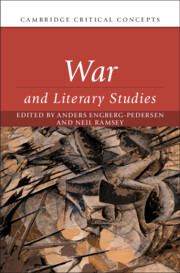Book contents
- War and Literary Studies
- Cambridge Critical Concepts
- War and Literary Studies
- Copyright page
- Contents
- Figures
- Contributors
- Acknowledgments
- Introduction: War, Literature, and the History of Knowledge
- Part I Origins and Theories
- Part II Foundational Concepts
- Part III Emerging Concepts
- Chapter 16 War and Drones
- Chapter 17 War and Humanitarianism
- Chapter 18 War and Capitalism
- Chapter 19 War and Revolution
- Chapter 20 War and Biopolitics
- Chapter 21 War and Nuclear Criticism
- Chapter 22 War and the Personality of Power
- Index
Chapter 17 - War and Humanitarianism
from Part III - Emerging Concepts
Published online by Cambridge University Press: 15 January 2023
- War and Literary Studies
- Cambridge Critical Concepts
- War and Literary Studies
- Copyright page
- Contents
- Figures
- Contributors
- Acknowledgments
- Introduction: War, Literature, and the History of Knowledge
- Part I Origins and Theories
- Part II Foundational Concepts
- Part III Emerging Concepts
- Chapter 16 War and Drones
- Chapter 17 War and Humanitarianism
- Chapter 18 War and Capitalism
- Chapter 19 War and Revolution
- Chapter 20 War and Biopolitics
- Chapter 21 War and Nuclear Criticism
- Chapter 22 War and the Personality of Power
- Index
Summary
The connection between literature about war and humanitarianism is complex. The war novel tends towards a human rights ethos that demands accountability for war atrocities. These novels express antiwar views, whereas humanitarianism’s genealogy in the laws of war reflects an acceptance of war as inevitable. Humanitarian discourse deploys a narrative paradigm that sees human suffering in war through trauma. In fiction, it frequently foregrounds the role of doctors and nurses as witnesses to war’s suffering. The resulting attention to victims’ disempowerment effectively reinforces the global inequality of lives and is problematic. This chapter argues that postcolonial literature of war offers a counterwitnessing that exceeds the affective accounts of trauma narratives and foregrounds the breach in humanitarianism’s imperative to save lives. Postcolonial literature’s critical engagement with war centers on the achievement of radical equality and visibility of all lives.
- Type
- Chapter
- Information
- War and Literary Studies , pp. 278 - 292Publisher: Cambridge University PressPrint publication year: 2023

